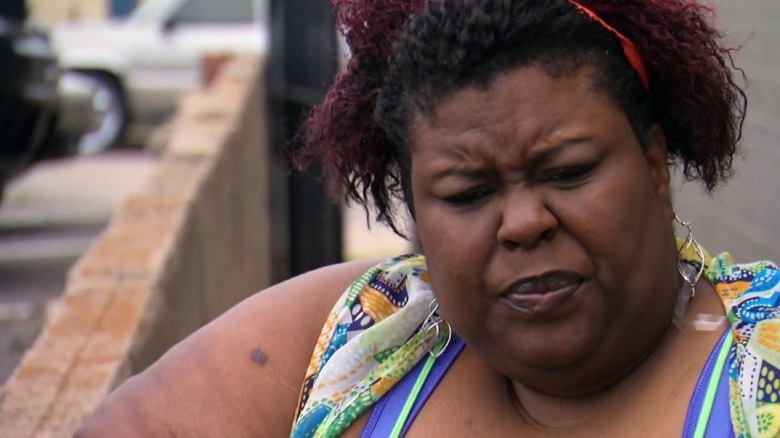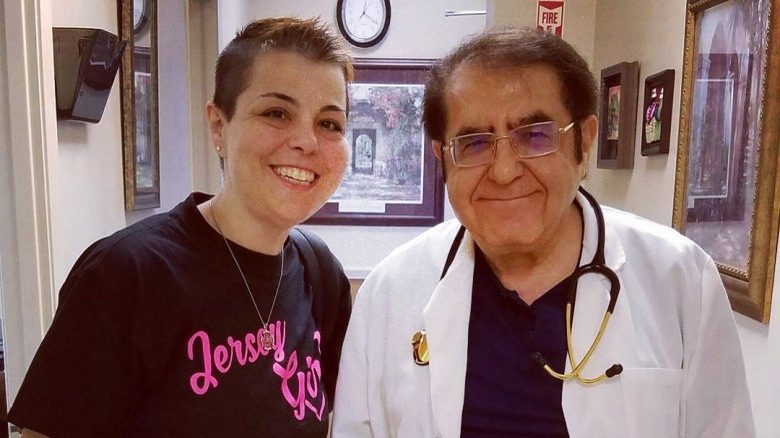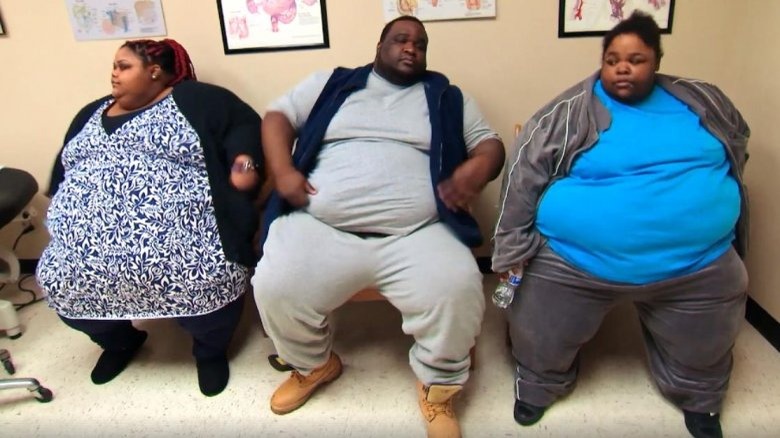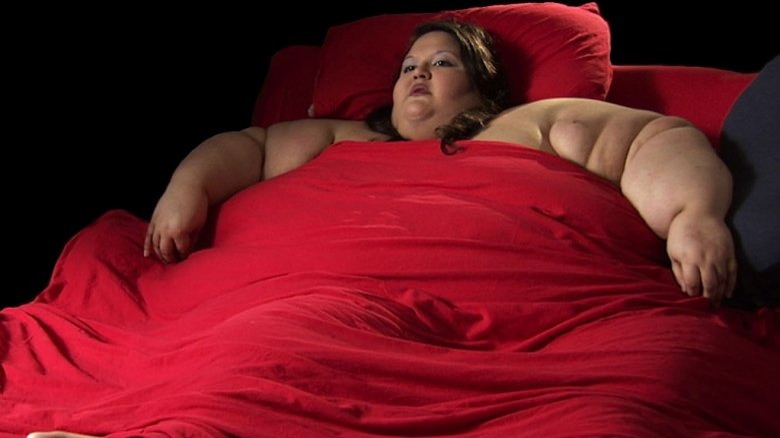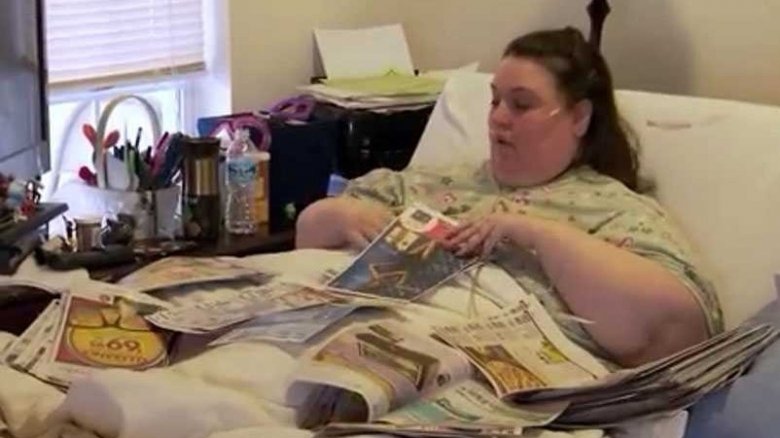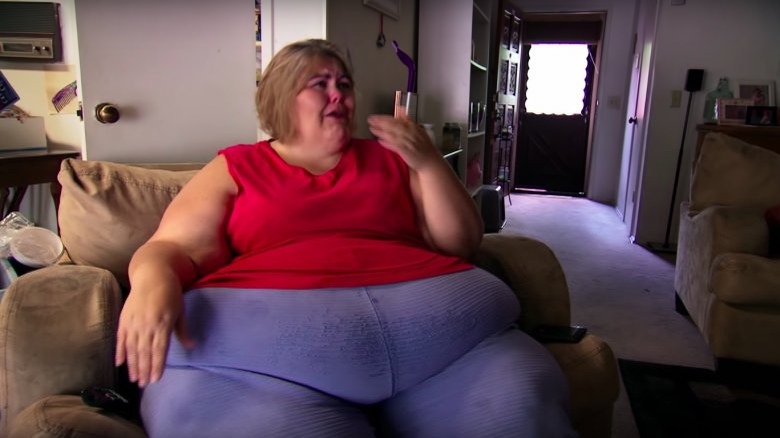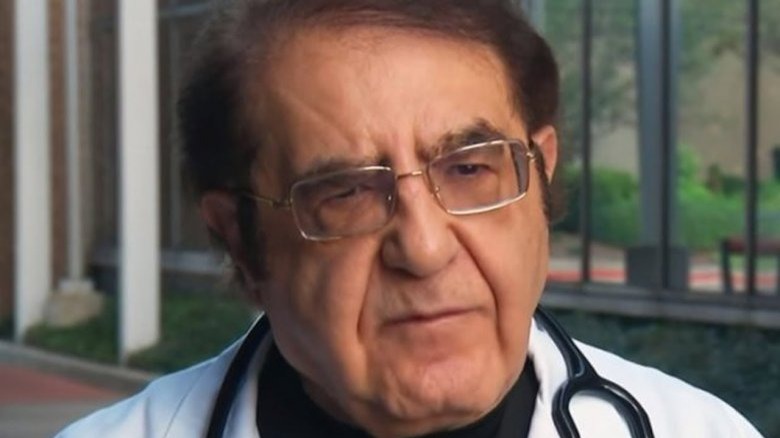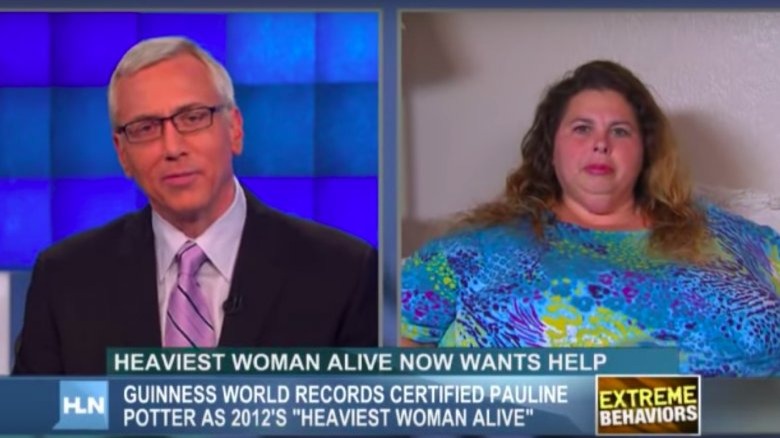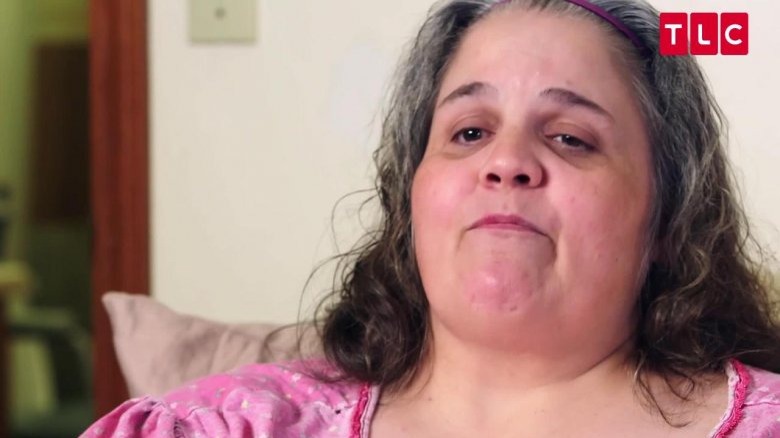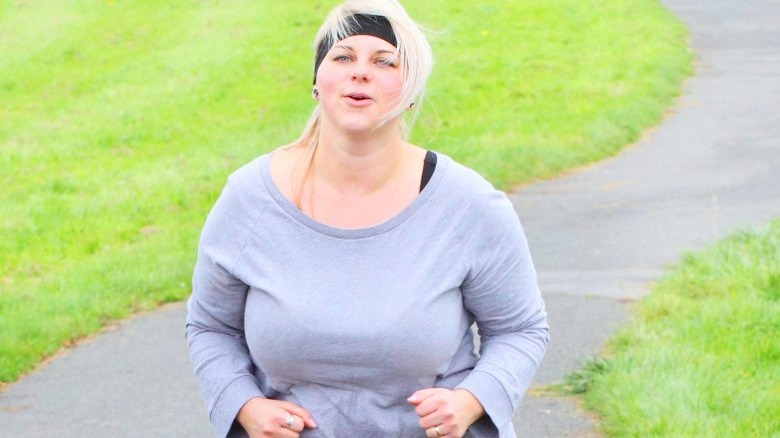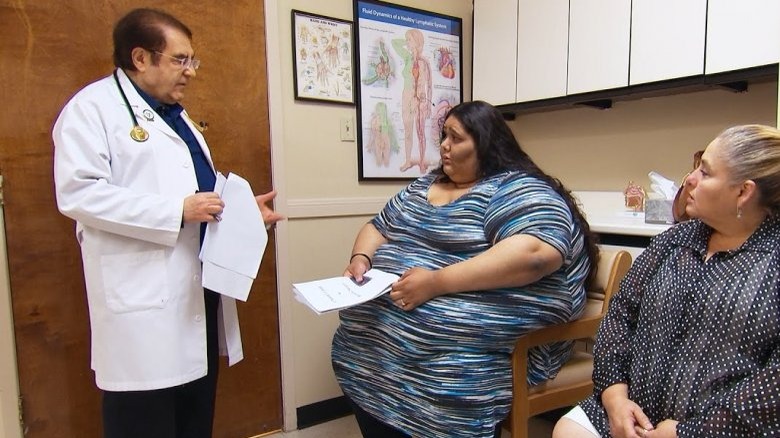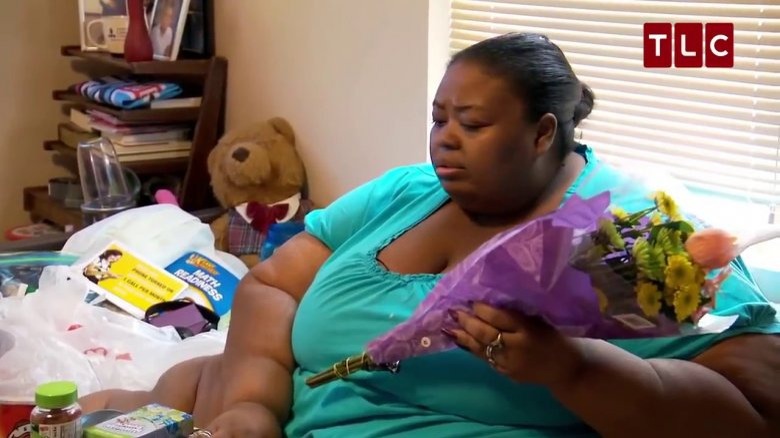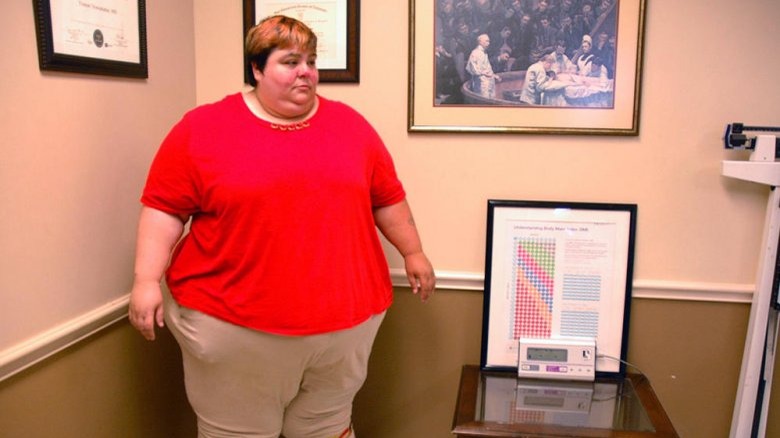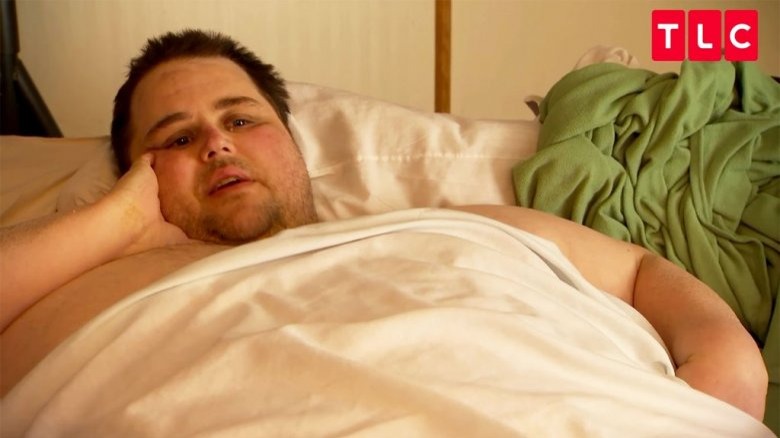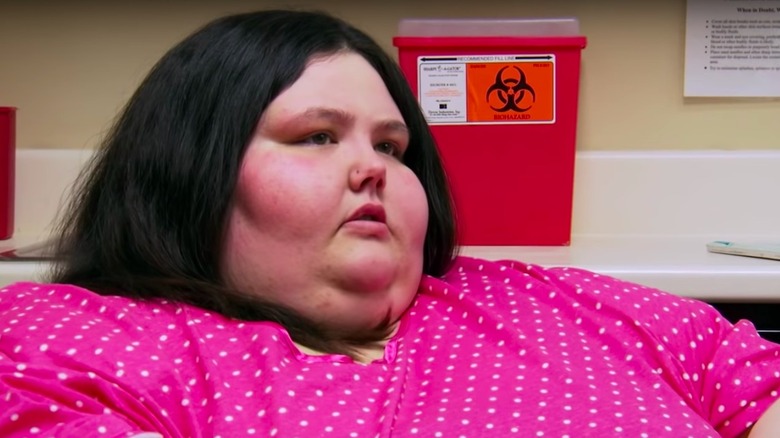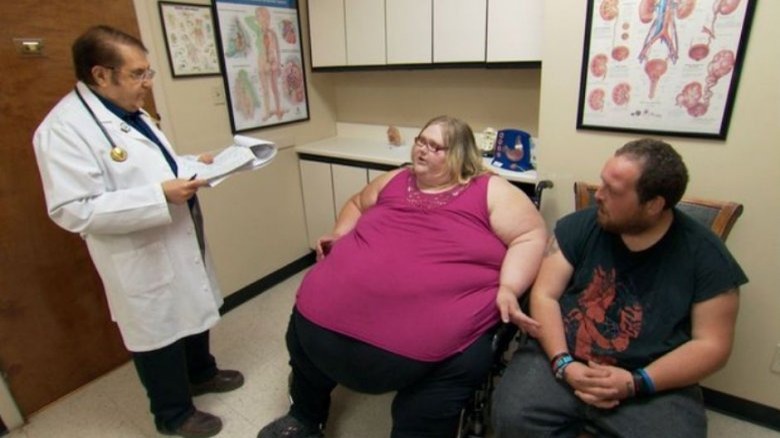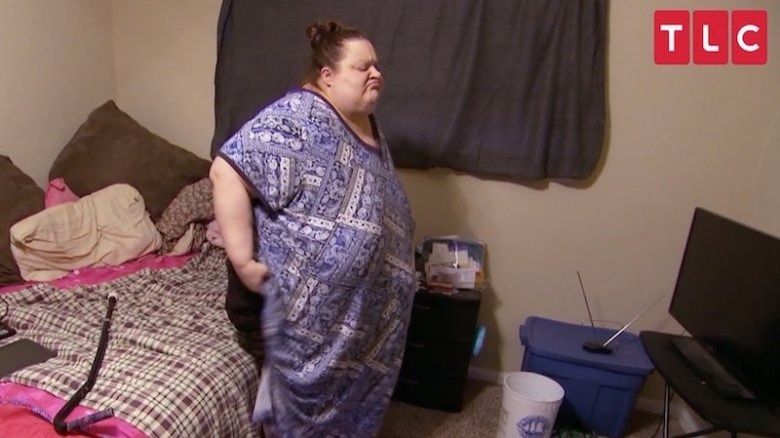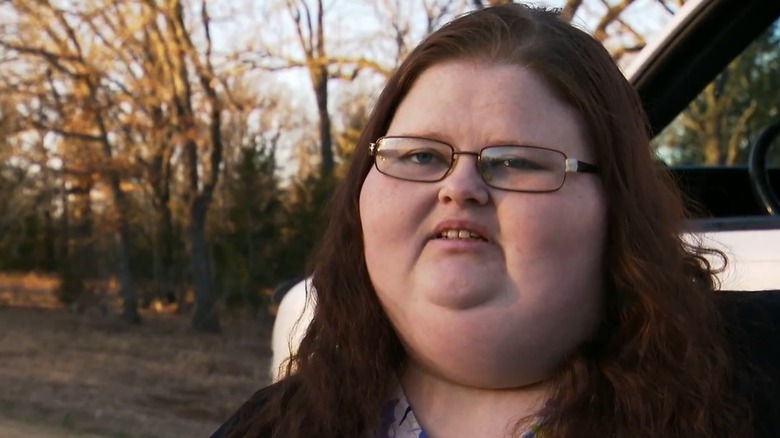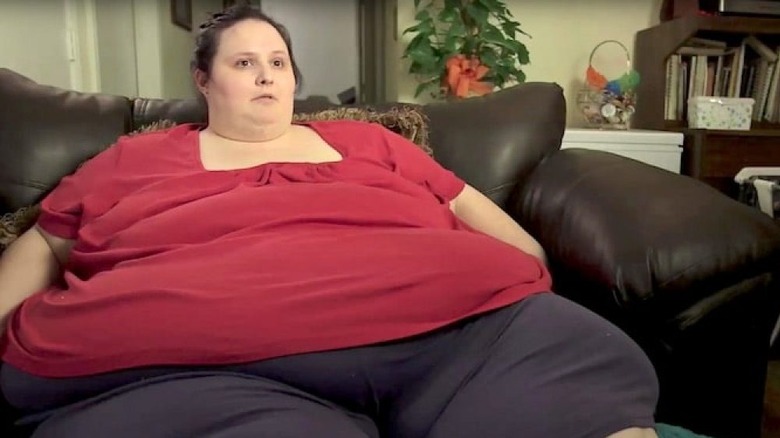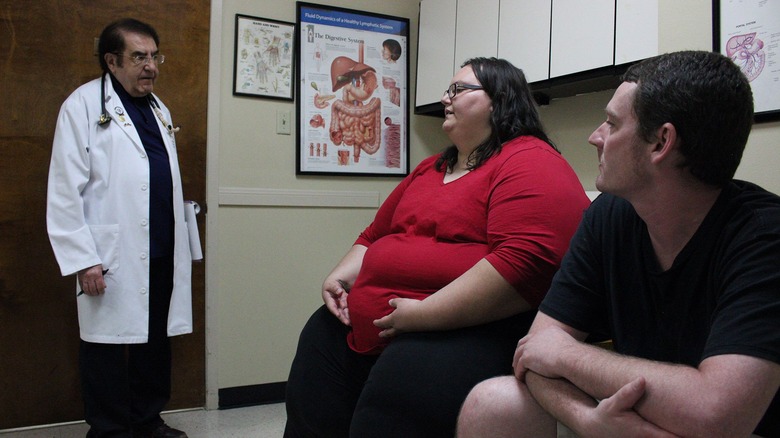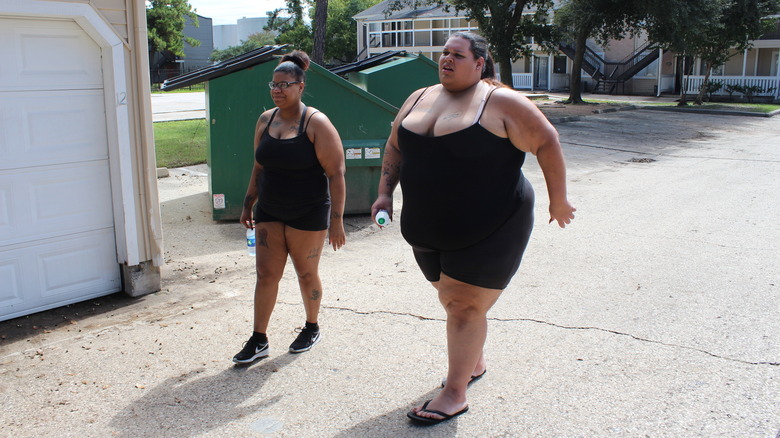The Untold Truth Of My 600-Lb Life
TLC's hit show My 600-lb Life has been on the air since 2012, illustrating the lives of ordinary people experiencing extraordinary obesity, and showcasing their struggles before, during, and after weight loss surgery. These individuals, often so large that other physicians cannot treat them, bring their hopes, dreams, and lives to the table and put them in the hands of Dr. Younan Nowzaradan, a surgeon in Houston, TX. More often than not, this crucial medical intervention helps to not just improve, but also save the lives of the show's participants. It's intense, y'all!
Even though My 600-lb Life showcases the most intimate details of its participants (and we mean intimate), there are still surprising aspects about the show itself that aren't as readily apparent. For example, do some of the participants have shady pasts? What's the deal with the show's enablers? And just how did the show come to be in the first place? Here's a look at things you might not know about the reality sensation.
Dr. Now is older than you think
Dr. Younan Nowzaradan, M.D., F.A.C.S., known as "Dr. Now" on My 600-lb Life, is the no-nonsense surgeon in Houston, TX who performs the weight loss surgeries that change people's lives on the program. Famous for his compassionate-yet-straight-up bedside manner, Dr. Now has performed over 2,000 weight loss surgeries, some of which were on the most challenging patients in the world. So he legit know what he's doing.
The Iranian-American doctor is in his 70s, but you might not know it as he looks younger. He graduated from Tehran University in Iran in 1970 with a doctorate in medicine, then moved to the United States to continue his training, and has been here ever since. Plus, in addition to bariatric surgery, Dr. Now performs both general and vascular surgery. His skills are the reason why patients on the show who don't live within driving distance of his practice move to Houston for the year-long duration of the program in order to receive treatment.
The show performs surgery on untreatable patients
Dr. Now is a pioneer in laparoscopic surgery, particularly as part of bariatric weight-loss surgery. He specializes in people who are "super-morbidly obese," which are patients with a BMI of 50 or more. Given that every participant on the show is at least 600 pounds, that means many patients have a BMI of 100 or more — pretty serious stuff.
Some doctors who perform weight loss surgery have a maximum limit for a client's starting weight. For example, the University of California at San Francisco Medical Center has a weight limit of 450 pounds, due to that being the biggest weight their x-ray machines can measure. Also, the more somebody weighs, the more the risks increase, as with any surgery. This is what sets both Dr. Now and the show apart, as those who aren't able to get bariatric surgery elsewhere come to his office.
Candidates for weight loss surgery are generally required to lose some weight on their own in order to receive the surgery, and Dr. Now's office is no different. That helps to evaluate whether the patient is really serious about changing their lives.
Dr. Now's son is the reason the show exists
So just how is it that My 600-lb Life came to be? Was it the brainchild of some TLC bigwig? Nope — turns out it was started by Jonathan Nowzaradan, a TV producer for Megalomedia and the son of Dr. Now. In 2007, the company filmed a documentary about Renee Williams, a local woman who weighed 841 pounds. Dr. Now performed weight loss surgery on Williams after other doctors refused to because she was deemed too much of a risk. Unfortunately, she died two weeks later of cardiac arrest.
The footage from this show was adapted into Half Ton Mum in the United Kingdom, which in turn led to the Half Ton Dad, Half Ton Teen, and yes, even Half Ton Killer? documentaries on TLC, as well as the A&E show Heavy. Megalomedia also filmed a number of bariatric surgery patients for seven years, which was edited into the first season of My 600-lb Life. Since then, the show only covers one year in people's lives, although they also air update episodes.
Weight loss surgery is no quick fix
There's a perception that weight loss surgery is somehow cheating, or is a quick, easy fix. And some people do go on My 600-lb Life with that attitude, thinking that weight loss surgery will make them thin without them having to make lifestyle changes. But that's definitely not the case.
A few patients on the show didn't change their lives for the better because they continued to eat compulsively and refused to move. One especially infamous participant named Penny Seager once complained on the show, "Where's my yellow brick road?" because she didn't lose much weight. Meanwhile, she refused to even get out of bed.
As Dr. Now often says on the show, weight loss surgery is a tool to use toward a greater goal. While bariatric surgery will shrink the size of the stomach significantly, thereby lowering the capacity of food that it can hold, that alone will not automatically spur weight loss. Adhering to the diet and exercise program the doctor prescribes is essential.
My 600-lb Life participants have been featured on fat fetish sites
Even though many people may find the body types of individuals on the show unattractive due in large part to society's very clear messages on what is deemed beautiful, there are folks out there who are turned on by very large bodies. To that end, there are a variety of BBW (big beautiful women) websites where women post suggestive pictures for men to admire. These communities are accepting and adoring of large women — a source of long-craved validation for women who have been made to feel badly about their bodies throughout their lives — so it's unsurprising that at least two women on the show had their photos on these sites.
For one, before she got picked to star on My 600-lb Life, Zsalynn Whitworth posted her lingerie photos on BBW sites in order to raise money for her weight loss surgery. There, she met her notorious now-ex-husband Gareth, who was "shopping for a fat girl" to marry on one of the sites. We're so glad she dumped that chump in the end, and found new love! The second participant to pose for a BBW site was Pauline Potter, who was Paulee Bombshell on the SuperSizedBombshells site.
Dr. Now had a messy divorce
Dr. Now might seem like a low-drama fellow, but he had his fair share when it came to his divorce. In 1975, he married Delores, who became a stay-at-home mother to their three children. Nearly 30 years later, before Dr. Now's ascent to television fame, Delores filed for divorce. The divorce dragged on for two years, and was finalized through a trial in 2004. After the ruling, Dr. Now appealed the division of property, but lost in 2007.
The appeals court opinion details how Dr. Now was accused of all sorts of shenanigans, including allegedly hiding assets, claiming to be retired, and reportedly obstructing the discovery process in the divorce. The court document states that "the trial court attributed fault in the breakup of the marriage to Younan, dissolved the marriage on grounds of cruelty and insupportability, and concluded that Younan committed waste of community assets." Ultimately, his wife won and received 70 percent of their assets. Yikes!
A few participants are real media hounds
Some of the stars of My 600-lb Life are more prone to seeking the spotlight than others — and sometimes in some unusual ways. For one, while the show did note that Steven Assanti (who appeared on the show in 2017) had made some pretty out there YouTube videos, they didn't mention that he was featured on Dr. Phil's "House of Hate" episode in 2007 as "John Assanti." He's... less than pleasant in his demeanor on the episode, to say the least.
Secondly, before landing a spot on TLC, Pauline Potter was also on Dr. Phil. Additionally, she had herself named as the Guinness Book of World Records' "Heaviest woman — living" at 643 pounds, even though the actual heaviest woman in the world weighed in at over 1000 pounds. She even appeared on Dr. Drew claiming she lost weight through marathon sex.
My 600-lb Life didn't address Potter's previous media presence when they aired her story. It's possible that the producers wanted to focus on her fight for her health instead of her tabloid exploits.
Patients are even less healthy than people realize
Most people are familiar with the fact that people who are obese are also at risk for developing medical problems such as diabetes, cardiovascular problems, stroke, and high blood pressure. But My 600-lb Life also shows how other conditions such as lymphedema (where the person's body parts can become swollen), skin infections, sleep apnea, anxiety, depression, and more are also common in people who weigh 600 pounds or more.
For example, Tracey Matthews, who was on the show in 2017, presented with one of the most dramatic cases of lymphedema and cellulitis in the show's history. The International Business Times noted that of the 605 pounds she weighed, 400 were in her legs. It was so bad that Dr. Now couldn't perform weight loss surgery safely until she lost 100 pounds. Fortunately she was able to turn it around!
Patients on the show also have suffered from social stigmatization and discrimination, which are detrimental to a person's well-being.
There's more physical pain than meets the eye
Often times, as seen on My 600-lb Life, weighing 600 pounds or more can be severely limiting and uncomfortable. In fact, some of the people on the show have been so heavy they literally could not walk — or in some cases, even get out of bed — because of their own weight. One such story was that of Lupe Donovan, who hadn't walked in 10 years when she started filming her episode. She's come a long way since then, though, according to a post on her Facebook page!
Another thing the show documents in detail is the severe pain that the stars suffer with when they are at their heaviest. None of the people on the show are elderly or terminally ill, yet they feel some sort of physical pain from the moment they get up in the morning until they go to sleep at night. Some can't even walk across the room without pain.
Many of the participants experienced childhood trauma
If you've ever watched the TV show Intervention, you know about the clear link between childhood trauma and addiction to drugs and alcohol. My 600-lb Life shows that it's the same deal with food addiction, which is what the participants all appear to be afflicted with. In many cases this is due to the terrible things they endured during their childhoods, such as sexual, physical, and/or emotional abuse.
Some participants were raped when they were young, and put on the weight as a protective mechanism. Others ate to make themselves feel better. For example, Ashley Reyes said she used food to cope after her uncle raped her when she was 12. "I didn't know what to do," she said on the show (via The Wrap). "I didn't know how to feel safe. So I would eat to gain back whatever little happiness I could."
That's why when participants start losing weight, emotions often bubble to the surface. Weight loss surgery has removed their coping mechanism (overeating), and that can present additional challenges. For example, it was only when Ashley went through therapy after surgery to deal with the abuse that she started to really lose weight.
No one on the show got obese without enablers
Regular viewers of My 600-lb Life know that the stars of the show all have at least one enabler, if not more, who brings them the food they want. You might wonder why the enablers don't simply stop bringing them unhealthy food, or commandeer the grocery cart at the supermarket, but it's not so simple. The psychology is, in fact, quite complicated.
In some instances, the show's participants sometimes make their caretakers' lives miserable by hollering and throwing fits until they get what they want. In other cases, the enablers are also heavy (albeit not as heavy) and they don't want to change their own diets. In other cases, the enablers want to be in a caretaker role, and fear they wouldn't be needed if their loved one gets healthier.
In any case, for participants to lose weight, the enabler has to be supportive of their journey. If they're not, like Zsalynn Whitworth's ex-husband Gareth, the relationship will end or the participant will have difficulty succeeding.
Participants usually don't know their real weight
It might seem crazy or hard to believe, but most of the people on the show don't know exactly how much they weigh until they see Dr. Now. Often times the patients are shocked by the number that they see, as they didn't expect it to be so high.
So how is it that so many of the stars of My 600-lb Life are unaware of their actual size? It's likely because regular, common bathroom scales generally don't measure over 300 pounds, for one. Even scales in a typical doctor's office aren't built to account for a body weight that high, so it can be difficult to ascertain how much someone weighs if they exceed the limit. In case you were wondering, the scale in Dr. Now's office goes up to 900 pounds, according to TLC.
Not every patient serves up an inspiring story
There are many heartwarming stories on My 600-lb Life, like Paula Jones, who persevered through her struggles, lost hundreds of pounds, and became a motivational speaker. Kudos, girl!
But then there are patients like James King, who ordered his family around from his bed. Not only did his daughter have to quit school to care for him, but he also got his father to refinance his house to pay for transport to Dr. Now's office. He also manipulated his girlfriend Lisa. In turn, she gave in to his food demands, and he gained over 150 pounds on the show when he was supposed to be losing weight. Dr. Now finally "fired" him as a patient and never performed surgery because James didn't take it seriously. Sadly, James passed away at the age of 49 on April 3, 2020, according to his obituary.
Steven Assanti gained notoriety in 2015, before he was on the show, when a Rhode Island hospital kicked him out for ordering pizza while he was a patient there. He was reportedly abusive to the nurses during previous hospital visits, too. His lowest moment may have been when he "accidentally" knocked a plastic bottle filled with his urine on the floor for the nurse to clean up. Yikes!
Most of the participants have significant others
You would think that having a severe eating disorder would limit your love life, but many of the participants on the show have husbands, wives, or live-in partners. One woman, Tanisha Cleveland, had a husband, but he reportedly left her during the show because he wasn't interested in helping her lose weight. She went ahead and found a new boyfriend — while still bedridden.
Many of the romantic relationships on the show change — some for the worse — after weight loss surgery. Some of the partners are overweight as well, and their partners' weight loss threatens them. But in some of the relationships, the partner just doesn't want their loved one to change. Others want to feel needed, and their partner's weight loss threatens them. Christina Phillips, a young woman on the show, said goodbye to over 500 pounds — and also reportedly bid farewell to her husband, because he preferred the caretaker role to supporting her new life. You're better off without him, boo!
The show has really humiliating bathroom scenes
Washing or using the bathroom can be a struggle at 600 pounds, especially in a world built for smaller bodies. Some participants on the show have a hard time just trying to squeeze into the bathroom or shower at all. To that end, many of them rely on sponge baths as their primary method of hygiene. In any case, each individual on the show has to be filmed at least once washing their bodies. Genital areas are censored, but viewers still get a full view of the patients' large body. It's very intimate.
Perhaps the most embarrassing instance was in an episode featuring Nicole Lewis, whose story aired in 2017. Both of her parents were drug addicts, and she ate her pain away. Unfortunately, she got so big that she couldn't fit in the shower, so she had to be washed by her partner outside on the porch. Fortunately she appears to be doing a lot better today!
It's not just what you eat, it's what's eating you
The saying "it's not what you eat, it's what eating you" is an applicable adage for the stars of My 600-lb Life. In its earlier seasons, the show didn't provide much in the way of therapy, but later seasons emphasize its importance. Without this tool, many participants have a hard time reigning in their emotions and improving their habits.
For example, Kirsten Perez was gang-raped as a teen, something she blamed herself for. She wasn't doing well in losing weight, even after gastric bypass surgery. Finally, Dr. Now ordered her to therapy, refusing to treat her anymore if she didn't go. Kirsten went to a therapist, who told her, "You have written a narrative in your mind where you're just as culpable as the perpetrators." She told her to "let go" of such "responsibility," and said that "it's important that you skew your thinking toward the positive." Kirsten took it to heart, and lost 170 pounds by the time the show was over, something that pleasantly surprised her family.
Some of the stars of My 600-lb Life have more than just weight loss surgery
While the primary goal for stars on My 600-lb Life is to qualify for weight loss surgery and shed pounds via diet and exercise, gastric bypasses and gastric sleeves aren't the only surgeries that Dr. Now's patients receive. That's because there are a host of other health issues that many of these individuals are dealing with, and sometimes going under the knife is the solution.
For example, Season 4 star Ashley Dunn Bratcher had to have emergency surgery to remove her gallbladder due to the presence of gallstones (via Daily Mail). And Bratcher's fellow Season 4 castmate Brittani Fulfer had skin removed from her abdomen, arms, and legs, as the excess was preventing her from being active and, in some cases, was painful.
Finally, a few of the stars of My 600-lb Life also hope to qualify for gender confirmation surgery, as they are transgender. That was the case for Season 3 cast member Chay Guillory, who came out in her follow-up episode. However, Dr. Now doesn't perform those surgeries — a specialist is needed.
My 600-lb Life kept filming in 2020 despite social distancing recommendations
When the COVID-19 pandemic became a serious concern, the CDC issued guidelines to slow the spread of the novel coronavirus. That included advising folks to follow social distancing measures and telling people with compromised immune systems to stay home for their own safety.
However, despite those recommendations, The Hollywood Reporterbroke the news that My 600-lb Life reportedly continued to film until March 26, 2020. This is especially concerning, as many of the members of the My 600-lb Life cast are particularly vulnerable due to their health issues and presumably weren't comfortable filming during a pandemic. "It's super dangerous and none of us wants to be the person who gives it to the castmember," a source told the publication. They also said crew members continued to work as they were afraid of losing their jobs, even though they might catch and spread the virus while filming.
Megalomedia, the company that produces My 600-lb Life, told The Hollywood Reporter that they'd stopped filming, as they'd apparently begun complying with government guidelines. "The health and safety of Megalomedia's show participants and employees is always our top priority, now more than ever," they said.
Is My 600-lb Life promoting fatphobia?
Viewers of My 600-lb Life can tell you that many of the show's stars turn their life around for the better. However, that hasn't stopped people from criticizing My 600-lb Life for some pretty significant reasons.
For one, some say that the show is guilty of perpetuating fatphobia and profiting off of the exploitation of larger people with significant trauma. That includes social justice writer Derrick Clifton, who voiced their criticism of TLC in an opinion piece for NBC News. "The network's approach to entertainment seems often to embrace the presumption that fat is inherently precarious and undesirable — and yet also worthy of constant surveillance," they wrote. "Fat people are curiosities to be probed and displayed for nonfat people."
While it can be argued that My 600-lb Life has certainly been more compassionate than shows like The Biggest Loser, as well as more medically safe, the show could do better, says author Roxane Gay. "I assure you that there are many fat people in the world, and their stories deserve to be told in a way that's not as exploitative as My 600-lb Life, which I hate-watch," she told Vogue.
Many of the stars of My 600-lb Life have filed lawsuits against Megalomedia
Plenty of My 600-lb Life stars have publicly sang the praises of Dr. Now for his life-saving help, such as Justin McSwain and Amber Radchi. But that hasn't always been the case for the company that produces the show, Megalomedia, which has come under fire on more than one occasion. Amber Radchi has criticized the production company, saying that Megalomedia bullied her and didn't respect her boundaries.
By late April 2020, no fewer than ten cast members of My 600-lb Life had filed lawsuits against Megalomedia for a variety of reasons. For example, Alicia Kirgan became the tenth person to sue the production company, alleging that they didn't provide her with adequate mental health counseling, according to Starcasm. Additionally, she claimed that they promised to pay for her medical costs related to surgery and reneged on the deal, something many of the other cast members have also claimed.
Other lawsuits have accused Megalomedia of fraud, gross negligence, and threatening to withhold payment for surgery if they didn't get footage that they wanted, as noted by Starcasm.
